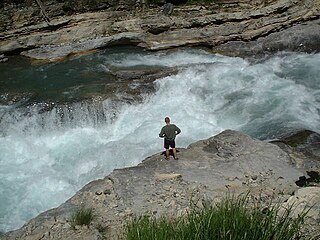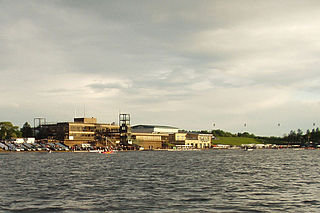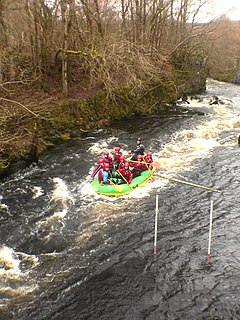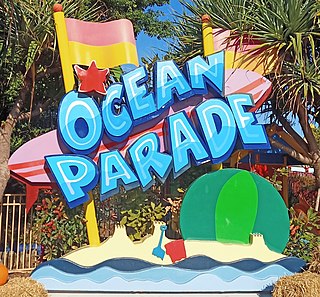
Zoetermeer is a city in the Western Netherlands, in the province of South Holland. The municipality covers an area of 37.05 km2 (14.31 sq mi) of which 2.60 km2 (1.00 sq mi) is water. A small village until the late 1960s, it had 6,392 inhabitants in 1950. By 2013 this had grown to 123,328, making it the third largest population centre in the province of South Holland, after Rotterdam and The Hague. While now a city in its own right, Zoetermeer started out as a The Hague suburb and is still a part of the Greater The Hague urban area.

Whitewater forms in a rapid context, in particular, when a river's gradient changes enough to generate so much turbulence that air is trapped within the water. This forms an unstable current that froths, making the water appear opaque and white.

Holme Pierrepont Country Park, home of The National Water Sports Centre is located in the hamlet of Holme Pierrepont near Nottingham, England and on the River Trent. It is used for many different types of sports and has recently received significant investment which has enabled a major refurbishment of existing facilities as well as introduction of new facilities.

The Tryweryn is a river in the north of Wales which starts at Llyn Tryweryn in the Snowdonia National Park and after 19 kilometres (12 mi) joins the river Dee at Bala. It is one of the main tributaries of the Dee and it was dammed in 1965 to form Llyn Celyn, drowning the village of Capel Celyn in spite of much popular and political opposition in Wales. The resulting graffito "Cofiwch Dryweryn" near Llanrhystud became and remains a popular icon of Welsh feeling. Water is stored in Llyn Celyn in winter when flows are high, and released over the summer to maintain the flow in the Dee (water from the Dee is used as the water supply for large areas of north-east Wales, and for the Wirral and much of Liverpool in England.

Canoe freestyle is a discipline of whitewater kayaking or canoeing where people perform various technical moves in one place, as opposed to downriver whitewater canoeing or kayaking where the objective is to travel the length of a section of river. Specialised canoes or kayaks (boats) known as playboats are often used, but any boat can be used for playing. The moves and tricks are often similar to those performed by snowboarders, surfers or skaters, where the athlete completes spins, flips, turns, etc. With modern playboats it is possible to get the kayak and the paddler completely airborne while performing tricks. The competitive side of playboating is known as freestyle kayaking.

An artificial whitewater course (AWWC) is a site for whitewater canoeing, whitewater kayaking, whitewater racing, whitewater rafting, playboating and slalom canoeing with artificially generated rapids.

The international scale of river difficulty is an American system used to rate the difficulty of navigating a stretch of river, or a single rapid. The scale was created by the American Whitewater Association to evaluate rivers throughout the world, hence international in the title. It should not be confused with the internationally used whitewater scale, which is published and adapted by a committee of the International Canoe Federation (ICF). The grade reflects the technical difficulty and skill level required associated with the section of river. The scale is of use to various water sports and activities, such as rafting, riverboarding, whitewater canoeing, stand up paddle surfing, and whitewater kayaking.

The Deutscher Wetterdienst or DWD for short, is the German Meteorological Service, based in Offenbach am Main, Germany, which monitors weather and meteorological conditions over Germany and provides weather services for the general public and for nautical, aviational or agricultural purposes. It is attached to the Federal Ministry of Transport and Digital Infrastructure. The DWDs principal tasks include warning against weather-related dangers and monitoring and rating climate changes affecting Germany. The organisation runs atmospheric models on their supercomputer for precise weather forecasting. The DWD also manages the national climate archive and one of the largest specialised libraries on weather and climate worldwide.

Canolfan Tryweryn is the National White Water Centre for Wales, and is based near Bala in North Wales. It developed the first commercial white water rafting operation in the UK in 1986, and since then has grown to become the largest and one of the most well-known rafting organisations in the UK. The centre is home to paddlesport National Governing Body Canoe Wales. The National White Water Centre is ideal for canoeing, kayaking, play-boating and coached groups who sometimes run BCU/CW Star Awards.

Creeking is a branch of canoeing and kayaking that involves descending very steep low-volume whitewater. It is usually performed in specialized canoes and kayaks specifically designed to withstand the extreme whitewater environment in which the activity occurs. In addition, the canoes and kayaks give the paddler improved performance and maneuverability needed to avoid river obstacles.

Flowriding is a late-20th century alternative boardsport incorporating elements of surfing, bodyboarding, skateboarding, skimboarding, snowboarding and wakeboarding. Flowriding takes place on an artificial wave called the FlowRider or the FlowBarrel. These waves were created by Wave Loch.

The Tees Barrage International White Water Course, originally the Teesside White Water Course, is an artificial whitewater course on the north bank of the River Tees, in northern England. It is part of the Tees Barrage and is located in the Stockton-on-Tees district, accessible by road only from Thornaby-on-Tees and best accessed by the A66. The course was built in 1995 at a cost of £2m. The course is now open once more under the new name TBIWWC.

Standup paddleboarding (SUP) is a water sport born from surfing with modern roots in Hawaii. Stand up paddle boarders stand on boards that are floating on the water, and use a paddle to propel themselves through the water. The sport was documented in a 2013 report that identified it as the outdoor sporting activity with the most first-time participants in the United States that year. Variations include flat water paddling, racing, surfing, whitewater SUP, yoga, and fishing.

The Ocoee Whitewater Center, near Ducktown, Tennessee, United States, was the canoe slalom venue for the 1996 Summer Olympics in Atlanta, and is the only in-river course to be used for Olympic slalom competition. A 1,640 foot stretch of the Upper Ocoee River was narrowed by two-thirds to create the drops and eddies needed for a slalom course. Today, the course is watered only on summer weekends, 34 days a year, for use by guided rafts and private boaters. When the river has water, 24 commercial rafting companies take more than 750 raft passengers through the course each day.

Wave Loch Inc. is a surf ride manufacturing company responsible for such water rides as the FlowBarrel, Flying Reef, SurfPool, Wave House franchises, and, formerly, FlowRider.

Ocean Parade is a themed land at the Dreamworld amusement park on the Gold Coast, Queensland, Australia. It features 3 of the Big 7 Thrill Rides at Dreamworld. The Claw, The Gold Coaster and Tail Spin. Are within close proximity of each other. Ocean Parade has an Australian beach culture theme, and has beach-themed rides scattered around the area. It currently provides a link between Main Street, DreamWorks Experience, and the adjacent water park WhiteWater World.

Raging Waters Sydney, formerly Wet'n'Wild Sydney, is a water park in the greater western Sydney suburb of Prospect, New South Wales, Australia, that opened on 12 December 2013. The park was announced on 11 September 2010 and was the third Wet'n'Wild water park operated by Village Roadshow Theme Parks, after locations on the Gold Coast and Las Vegas. On 2 July 2018, it was announced that the park had been acquired by Parques Reunidos. It is the only attraction outside the United States owned by Palace Entertainment.

The following outline is provided as an overview of canoeing and kayaking:

WhiteWater West is a manufacturing company based in Richmond, British Columbia, Canada. It was established in 1980 and manufactures a variety of products for water parks including water slides and water play areas. The company also owns FlowRider, which produces a line of surf simulators.
ISO 7010 is an International Organization for Standardization technical standard for graphical hazard symbols on hazard and safety signs, including those indicating emergency exits. It uses colours and principles set out in ISO 3864 for these symbols, and is intended to provide "safety information that relies as little as possible on the use of words to achieve understanding." It is distinct from the Globally Harmonized System of Classification and Labelling of Chemicals specified by the United Nations to standardise hazardous material classification and labelling.


















